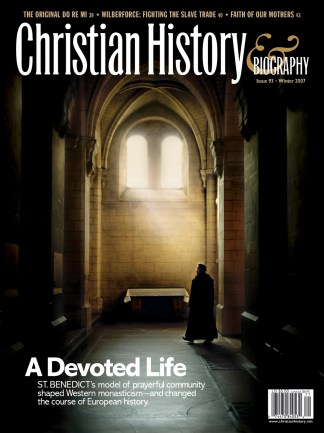Jean-Pierre de Caussade (1675-1751) was an ordained member of the Society of Jesus in Toulouse, France. He traveled widely as a preacher and in 1731 became the spiritual director of a Jesuit retreat house. Many of his letters to the nuns under his care were collected into the devotional classic Self-Abandonment to Divine Providence (translated by Kitty Muggeridge as The Sacrament of the Present Moment).
There is a tendency today to think of the great Devotional Masters almost as people from another planet, certainly as folk unconcerned with life in our hectic workaday world. And yet so often I have discovered just the opposite: these were people who sought to redeem and “hallow” the common ventures of life. Jean-Pierre de Caussade was one such person and his book, The Sacrament of the Present Moment, has changed forever the way I look at “ordinary” life.
My first encounter with The Sacrament of the Present Moment occurred aboard one of modern technology’s finest inventions for solitude—the airplane. The journey was long, but the inward journey I entered into that day was far greater. Caussade was urging me to experience each moment—this very moment—as a holy sacrament, a visible sign of invisible grace. I felt a gracious invitation to cease my frantic striving for holiness and rest in the Light of Christ. That airplane trip became a hallowed time, a holy day, a sacramental moment.
This wonderful experience was followed by many more. Because of my readings in Caussade, these persistent questions had begun to intrude upon the ordinary events of my day. “In what sense can this experience be a divine sacrament?” “How is Christ mediated to me through this task?” “How can the fulfillment of this present duty be a participation in the life and death of Christ?”
Please understand, I am not referring to “religious” tasks, such as prayer or Holy Communion. I could quite readily understand and experience their sacramental character. Rather, I was examining much more ordinary activities, the “stuff” that made up the bulk of my days—teaching students, answering correspondence, playing with my boys, repairing broken window panes, paying bills, washing dishes. How could these events take on sacramental significance?
Caussade understood that our obedience to “the duty to the present moment” is the path to holiness. “No moment is trivial,” observes Caussade, “since each one contains a divine Kingdom, and heavenly sustenance.”
Caussade beckons us to a way of living that eschews all sacred/secular dichotomies. For him nothing is secular since God’s activity permeates all things, even the most trivial. He urges us never to look “for the holiness of things but only the holiness within things.” Even time itself is a sacrament for “time is but the history of divine action!”
Slowly, and without my conscious effort, a greater sense of wonder and spiritual wholeness began to make its way into my daily activities. Quiet worship and adoration began to flow out of (rather than in spite of) common tasks. Inward strength and spiritual graces began to slip into my heart as mysteriously as the life of God steals into us through the Eucharist.
This duty to the present moment as the place where I find God is not always a welcome word to me. Often I want to bypass this moment, this duty, in favor of some future moment—one that is more challenging, more stimulating, more rewarding. That, I assume, is the place where God will bless me, not here, not in this task. The simple truth, of course, is that the only place God can bless me is where I am, because that is the only place I am.
Caussade invited me to discover that right where we are is holy ground, in the families we have been given, in the tasks we are assigned, among our neighbors and friends. It is this that makes living in our modern world bearable, even enjoyable. Indeed, it enables us, as George Fox put it, to “walk cheerfully over the earth.”
Richard J. Foster is the author of Celebration of Discipline and the founder of Renovaré, an organization dedicated to spiritual formation and church renewal. This article is adapted from his essay, “The Devotional Masters: A Love Affair,” in More Than Words, compiled by Philip Yancey and edited by James Calvin Schaap (Baker Books, a division of Baker Publishing Group, 2002).
Copyright © 2007 by the author or Christianity Today/Christian History & Biography magazine. Click here for reprint information on Christian History & Biography.










